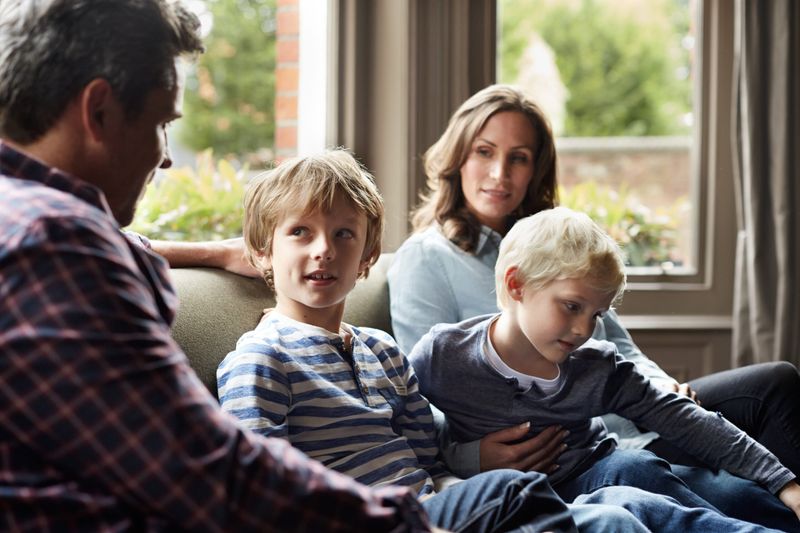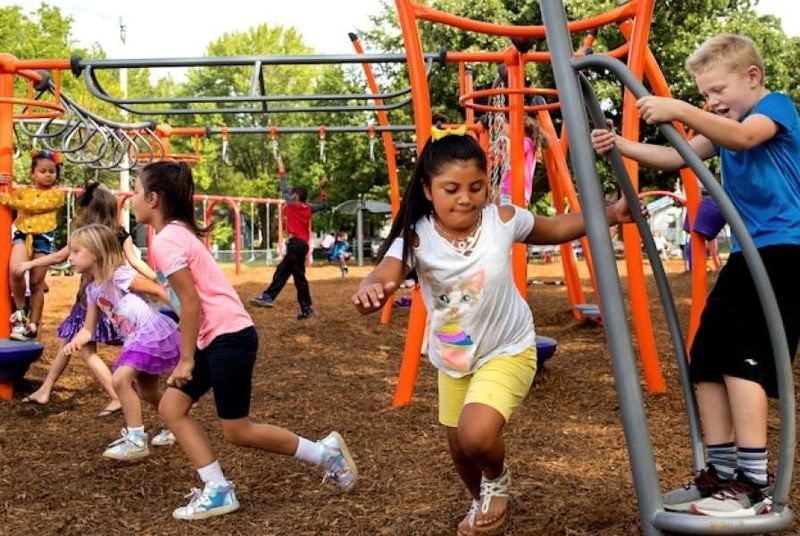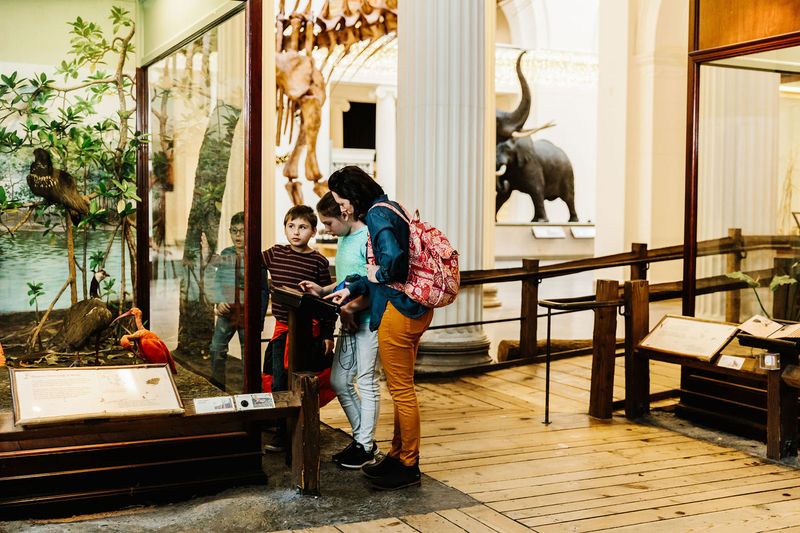16 ‘Woke’ Parenting Rules Millennials Swear By (But Boomers Think Are Absurd)
Dive into the world of modern parenting as millennials embrace new values that often clash with traditional Boomer views. From emotional awareness to redefining discipline, explore these 16 ‘woke’ parenting rules that have sparked conversation and change across generations.
1. Kids get to have big feelings—and talk about them

Gone are the days when children were expected to be seen and not heard. Modern parenting embraces the notion that even the smallest voices have big emotions. With open arms and listening ears, millennial parents encourage their kids to express their feelings freely.
This shift prioritizes emotional health and communication, fostering a nurturing environment where children feel valued. Whether it’s a meltdown or a joyful outburst, every emotion is acknowledged and discussed. This approach contrasts with the Boomer era, where emotions were often kept under wraps. By validating feelings, parents aim to raise emotionally intelligent and confident individuals.
2. Every voice matters, even the tiniest one

In the world of millennial parenting, everyone has a say, no matter how tiny the voice. Family discussions have expanded to include the youngest members, fostering a sense of inclusion and importance.
This approach teaches children that their opinions matter, nurturing self-esteem and confidence from an early age. Boomers, on the other hand, often reserved decision-making for adults.
By encouraging even toddlers to voice their thoughts, parents hope to cultivate future leaders who trust in their ability to contribute meaningfully. This kind of inclusive dialogue sets the stage for respectful communication.
3. Spanking is totally off the table

In today’s parenting landscape, physical discipline like spanking has taken a back seat. Millennial parents prefer calm discussions and positive reinforcement over punitive measures. This evolution stems from a deeper understanding of child psychology and a commitment to non-violent communication.
While Boomers might recall a different era of discipline, this new approach emphasizes understanding and empathy. By focusing on constructive conversations, parents aim to guide behavior rather than punish it.
This shift not only nurtures a safer environment but also builds trust and mutual respect between parents and children.
4. “No” isn’t the final answer—sometimes it’s negotiable

‘No’ might not always mean no in the world of woke parenting. Millennials often see rules as flexible, allowing room for negotiation and compromise. This dynamic approach encourages kids to develop critical thinking and problem-solving skills as they learn to present their case.
Contrastingly, Boomers often viewed parental decisions as final. By treating rules as guidelines rather than absolutes, parents foster a collaborative environment.
This negotiation process also teaches children about compromise and the give-and-take nature of relationships.
5. Kids don’t owe anyone hugs or kisses

In a world that’s increasingly aware of personal boundaries, millennial parents teach their children that consent matters, even when it comes to hugs and kisses.
Unlike previous generations, which often encouraged obligatory affection, today’s parents empower their kids to decide when and how to show physical affection. This practice emphasizes autonomy and respect for personal space.
Boomers might find this approach puzzling, but the focus here is on teaching children to assert their comfort levels confidently. By fostering respect for bodily autonomy, parents are raising a generation that values consent.
6. Mental health days are legit

Gone are the days when a sick day was the only acceptable reason to miss school. Millennials recognize the importance of mental health and allow their children to take days off when needed.
This modern approach prioritizes emotional well-being and acknowledges that mental health is just as important as physical health.
Boomers might view this as indulgent, but taking a mental health day can prevent burnout and stress. By normalizing self-care, parents teach their children the importance of balance and mindfulness.
7. Play is just as important as academics

In the bustling world of modern parenting, play isn’t just a pastime—it’s a crucial component of a child’s development. Millennial parents prioritize playtime, understanding its role in fostering creativity and social skills.
While academic achievements often took center stage for Boomers, today’s parents see the value in a balanced approach. Play encourages children to explore the world around them, develop problem-solving skills, and build friendships.
By valuing play, parents ensure that their children grow up well-rounded and fulfilled.
8. Talking about emotions is a daily habit

In today’s emotionally aware households, discussing emotions isn’t reserved for special occasions—it’s part of the daily routine. Millennial parents make it a point to talk about feelings regularly, teaching their children to articulate their emotions effectively.
This practice builds emotional intelligence and strengthens family bonds. Boomers might have approached emotions more reservedly, but today’s parents see the value in openness. By normalizing emotional discussions, they prepare their children for healthy relationships and self-awareness.
9. Screen time isn’t evil—it’s managed

In a digital age, millennial parents have redefined the rules around screen time. Instead of viewing it as the enemy, they manage and guide its use, understanding the educational and entertainment benefits it can offer.
While Boomers might have seen screens as a distraction, today’s parents focus on balance and quality content. By setting clear guidelines, they ensure that screen time is both fun and informative. This approach allows children to enjoy technology while maintaining healthy habits. .
10. Gender-neutral everything

Millennial parents are embracing a world beyond traditional gender norms, creating environments where their children can explore freely. From clothing to toys, gender neutrality is the new norm.
Unlike Boomers, who often adhered to pink and blue divides, today’s parents see the value in allowing children to define their identity without constraints.
This practice encourages inclusivity and self-expression, laying the foundation for a more open-minded generation. By providing diverse options, parents enable children to explore their interests without bias.
11. Gentle parenting over authoritarian discipline

The days of strict authoritarian discipline are fading as millennial parents embrace a gentler approach. This parenting style focuses on empathy, understanding, and connection rather than fear and control. Boomers might recall firmer boundaries, but today’s parents prioritize nurturing relationships.
By choosing gentle parenting, they aim to teach through positive modeling and encouragement. This shift fosters a supportive environment where children feel secure and loved.
12. Apologies go both ways—parents too

In the world of woke parenting, apologies are a two-way street. Millennial parents aren’t afraid to admit when they’re wrong and apologize to their children. This practice models humility and respect, teaching children the value of accountability.
Unlike the Boomer era, where parental authority often went unquestioned, today’s parents emphasize mutual respect. By showing that everyone makes mistakes, they encourage a culture of open communication and trust.
13. Feelings aren’t dismissed, they’re named

In modern parenting, feelings are given names, not just acknowledged. Millennial parents actively teach their children to identify and articulate their emotions, fostering emotional literacy. This proactive approach contrasts with the Boomer tendency to overlook or downplay feelings.
By focusing on naming emotions, parents equip their children with tools for self-expression and empathy. This practice not only aids personal development but also enhances social interactions.
14. School isn’t the only place to learn

Millennial parents recognize that education extends beyond classroom walls. They embrace diverse learning experiences like museums, nature walks, and cultural events, understanding that these enrich a child’s knowledge and curiosity.
While Boomers might have focused more on formal education, today’s parents see the world as a classroom. By valuing experiential learning, they encourage lifelong curiosity and adaptability. This broadened perspective allows children to connect their education to the real world.
15. Conversations about race, identity, and fairness start early

In today’s woke households, conversations about race, identity, and fairness aren’t postponed—they’re embraced early on. Millennial parents understand the importance of raising socially conscious children. Unlike the Boomer era, where such topics were often avoided, today’s parents tackle them head-on.
This openness encourages children to appreciate diversity and think critically about social justice. By fostering an inclusive mindset, parents hope to cultivate empathy and awareness in their children.
16. “Because I said so” doesn’t cut it anymore

The phrase ‘because I said so’ is losing ground as millennial parents opt for transparency and reasoning. They believe in explaining the ‘why’ behind decisions, promoting understanding and cooperation. Boomers might have favored unquestioned authority, but today’s parents see value in mutual respect and dialogue.
By offering explanations, they empower children to think critically and understand consequences. This approach builds trust and strengthens the parent-child relationship.






